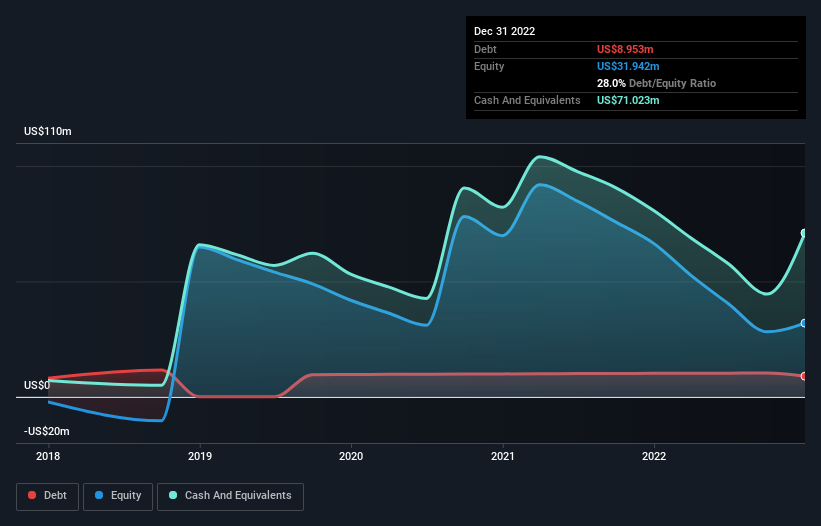
Some say volatility, rather than debt, is the best way to think about risk as an investor, but Warren Buffett famously said that 'Volatility is far from synonymous with risk.' So it might be obvious that you need to consider debt, when you think about how risky any given stock is, because too much debt can sink a company. As with many other companies Equillium, Inc. (NASDAQ:EQ) makes use of debt. But the real question is whether this debt is making the company risky.
When Is Debt A Problem?
Debt assists a business until the business has trouble paying it off, either with new capital or with free cash flow. Ultimately, if the company can't fulfill its legal obligations to repay debt, shareholders could walk away with nothing. However, a more usual (but still expensive) situation is where a company must dilute shareholders at a cheap share price simply to get debt under control. Having said that, the most common situation is where a company manages its debt reasonably well - and to its own advantage. When we think about a company's use of debt, we first look at cash and debt together.
See our latest analysis for Equillium
What Is Equillium's Debt?
As you can see below, Equillium had US$8.95m of debt at December 2022, down from US$10.2m a year prior. But it also has US$71.0m in cash to offset that, meaning it has US$62.1m net cash.

How Strong Is Equillium's Balance Sheet?
We can see from the most recent balance sheet that Equillium had liabilities of US$32.0m falling due within a year, and liabilities of US$14.4m due beyond that. On the other hand, it had cash of US$71.0m and US$2.84m worth of receivables due within a year. So it can boast US$27.4m more liquid assets than total liabilities.
This surplus liquidity suggests that Equillium's balance sheet could take a hit just as well as Homer Simpson's head can take a punch. On this view, lenders should feel as safe as the beloved of a black-belt karate master. Succinctly put, Equillium boasts net cash, so it's fair to say it does not have a heavy debt load! There's no doubt that we learn most about debt from the balance sheet. But it is future earnings, more than anything, that will determine Equillium's ability to maintain a healthy balance sheet going forward. So if you're focused on the future you can check out this free report showing analyst profit forecasts.
In the last year Equillium managed to produce its first revenue as a listed company, but given the lack of profit, shareholders will no doubt be hoping to see some strong increases.
So How Risky Is Equillium?
By their very nature companies that are losing money are more risky than those with a long history of profitability. And the fact is that over the last twelve months Equillium lost money at the earnings before interest and tax (EBIT) line. Indeed, in that time it burnt through US$9.0m of cash and made a loss of US$62m. But at least it has US$62.1m on the balance sheet to spend on growth, near-term. Even though its balance sheet seems sufficiently liquid, debt always makes us a little nervous if a company doesn't produce free cash flow regularly. There's no doubt that we learn most about debt from the balance sheet. However, not all investment risk resides within the balance sheet - far from it. For example Equillium has 4 warning signs (and 1 which is a bit unpleasant) we think you should know about.
When all is said and done, sometimes its easier to focus on companies that don't even need debt. Readers can access a list of growth stocks with zero net debt 100% free, right now.
Valuation is complex, but we're here to simplify it.
Discover if Equillium might be undervalued or overvalued with our detailed analysis, featuring fair value estimates, potential risks, dividends, insider trades, and its financial condition.
Access Free AnalysisHave feedback on this article? Concerned about the content? Get in touch with us directly. Alternatively, email editorial-team (at) simplywallst.com.
This article by Simply Wall St is general in nature. We provide commentary based on historical data and analyst forecasts only using an unbiased methodology and our articles are not intended to be financial advice. It does not constitute a recommendation to buy or sell any stock, and does not take account of your objectives, or your financial situation. We aim to bring you long-term focused analysis driven by fundamental data. Note that our analysis may not factor in the latest price-sensitive company announcements or qualitative material. Simply Wall St has no position in any stocks mentioned.
About NasdaqCM:EQ
Equillium
A clinical-stage biotechnology company, develops therapeutics to treat severe autoimmune and inflammatory, or immuno-inflammatory disorders with unmet medical need in the United States.
Excellent balance sheet moderate.
Market Insights
Community Narratives



